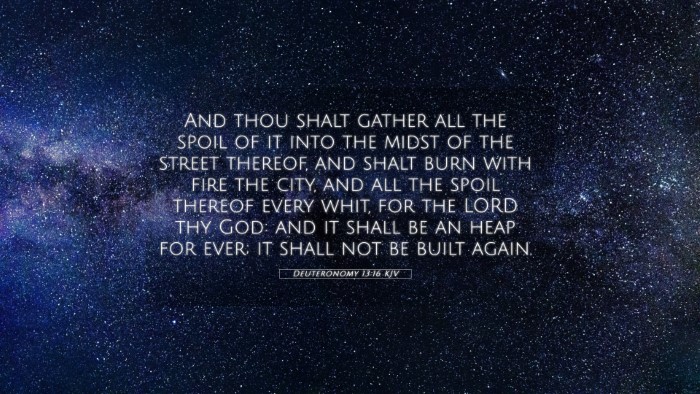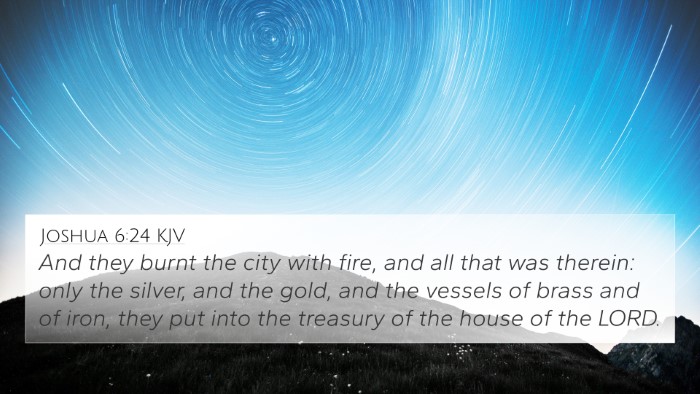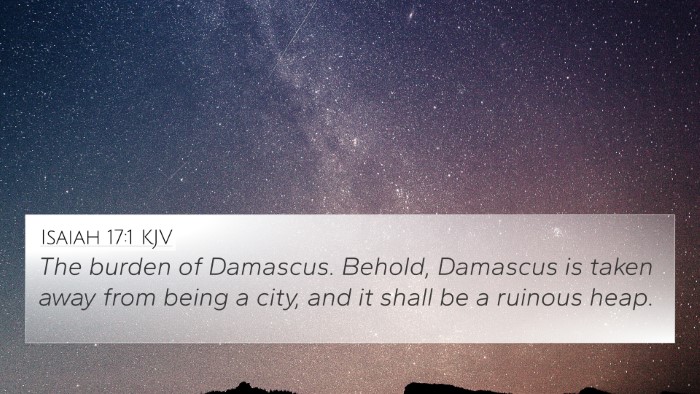Understanding Deuteronomy 13:16
Deuteronomy 13:16 states: "And thou shalt gather all the spoil of it into the midst of the street thereof, and shalt burn with fire the city, and all the spoil thereof every whit, for the Lord thy God: and it shall be an heap for ever; it shall not be built again."
This verse emphasizes the concept of dedicated destruction for the sake of safeguarding spiritual integrity. The ancient Israelites, upon encountering cities that led them into idolatry, were instructed to completely destroy these places, ensuring that nothing of their sinful influence remained.
Commentary Insights
Insights from renowned public domain commentaries provide a deeper understanding of this verse:
-
Matthew Henry:
Henry emphasizes the seriousness with which God approached the eradication of idolatry. He notes that the command was not simply about destruction, but about purifying the community from influences that could lead them astray. The act of burning the city symbolizes a total rejection of the sinful practices embedded in that society.
-
Albert Barnes:
Barnes explains how the destruction of such cities serves as a deterrent. By completely removing the remnants of these cities, it prevents any temptation for the Israelites to return to idolatry. This illustrates God's desire for His people to remain faithful and pure in their worship.
-
Adam Clarke:
Clarke highlights the significance of 'every whit' indicating the thoroughness of their actions. Nothing was to be preserved from the city, linking this command to the broader theme of complete devotion to God and His laws.
Thematic Connections
Deuteronomy 13:16 can be understood in light of several inter-Biblical themes and connections:
-
Purity of Worship:
The verse resonates with the theme of keeping one’s worship pure, seen throughout the Bible. This underscores a continuous narrative of fidelity to God.
-
Consequences of Idolatry:
It reflects the dire consequences associated with straying from God, as seen in scriptures like Exodus 22:20 and Leviticus 20:1-5.
Cross-references
Here are several Bible verses that connect with the themes of Deuteronomy 13:16:
- Exodus 22:20 - "He that sacrificeth unto any god, save unto the Lord only, he shall be utterly destroyed."
- Leviticus 20:1-5 - Discusses the punishment for worshiping Molech.
- Numbers 33:52 - The directive to drive out all inhabitants of the land.
- Joshua 6:17 - Jericho’s devoted destruction signifies God's judgment.
- 1 Corinthians 10:14 - "Wherefore, my dearly beloved, flee from idolatry."
- Revelation 21:8 - Those who practice idolatry face eternal judgment.
- Jeremiah 44:4 - A warning against the worship of other gods.
Application and Modern Implications
The lessons derived from Deuteronomy 13:16 remain relevant today, especially when considering personal practices of worship and the influence of worldly temptations. The concept of setting boundaries to protect one’s faith journey is fundamental.
Concluding Thoughts
In summary, Deuteronomy 13:16 reveals God's expectations for His people concerning idolatry and underscores the importance of maintaining spiritual purity. The thorough destruction of idolatrous influences serves as a critical reminder of the lengths to which one must go to eliminate temptations and remain devoted to God.
Further Study Tools
For deeper insights into cross-referencing biblical texts and understanding the connections between verses, consider utilizing various Bible study tools:
- Bible concordance for finding specific references.
- Bible cross-reference guides to connect themes across scriptures.
- Comprehensive Bible cross-reference materials to explore biblical narratives.
- Tools for biblical cross-referencing that enhance personal study and understanding.
Explore Related Themes
Inter-Biblical dialogue allows believers to explore how various scriptures converse with each other on the theme of idolatry, devotion, and the protection of spiritual integrity. For examples, take a look at:
- Identifying connections between Old and New Testament teachings.
- Analyzing links between the Prophets and Apostolic teachings on faithfulness.
- Studying comparative Bible verse analysis to interpret similar themes.
By using these methodologies and references, one can fully appreciate the profound teachings contained within Deuteronomy 13:16 and its invaluable lessons on faith and purity.










